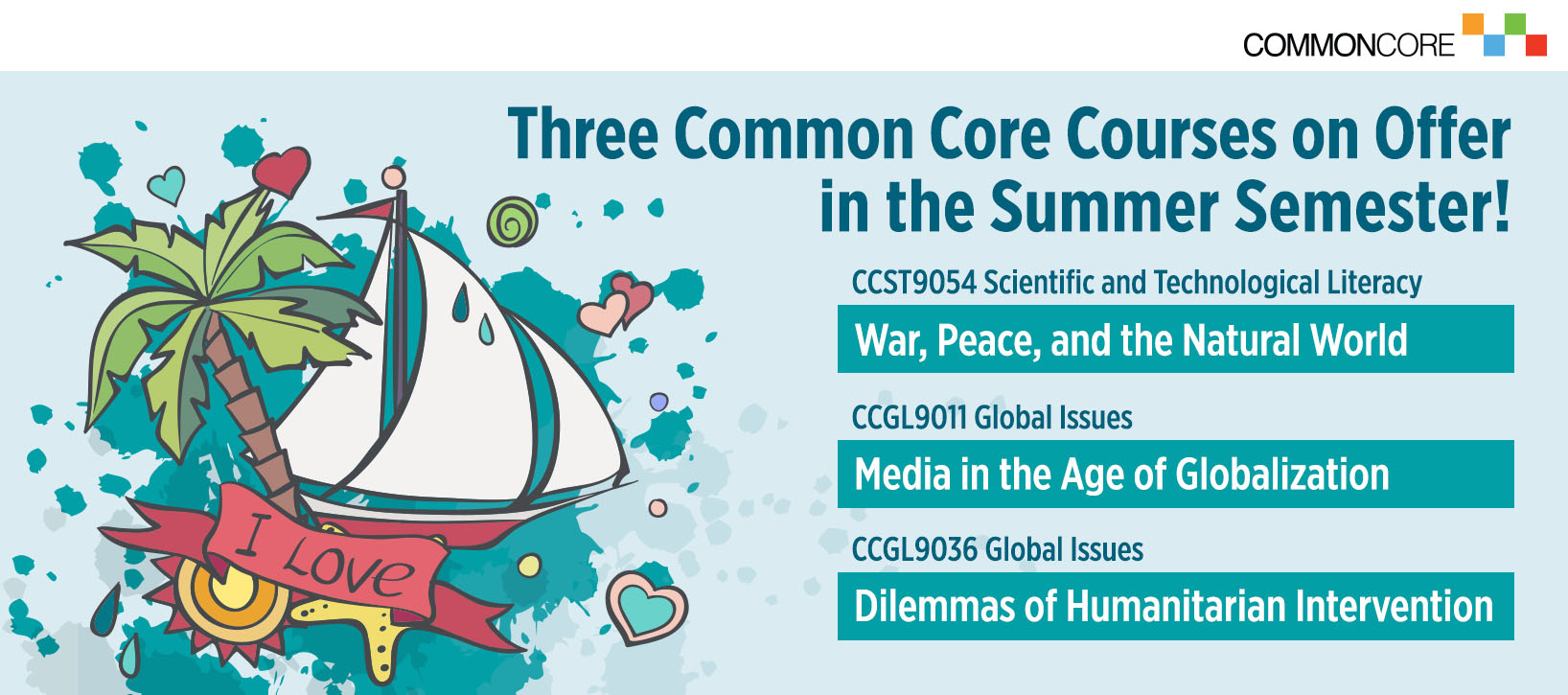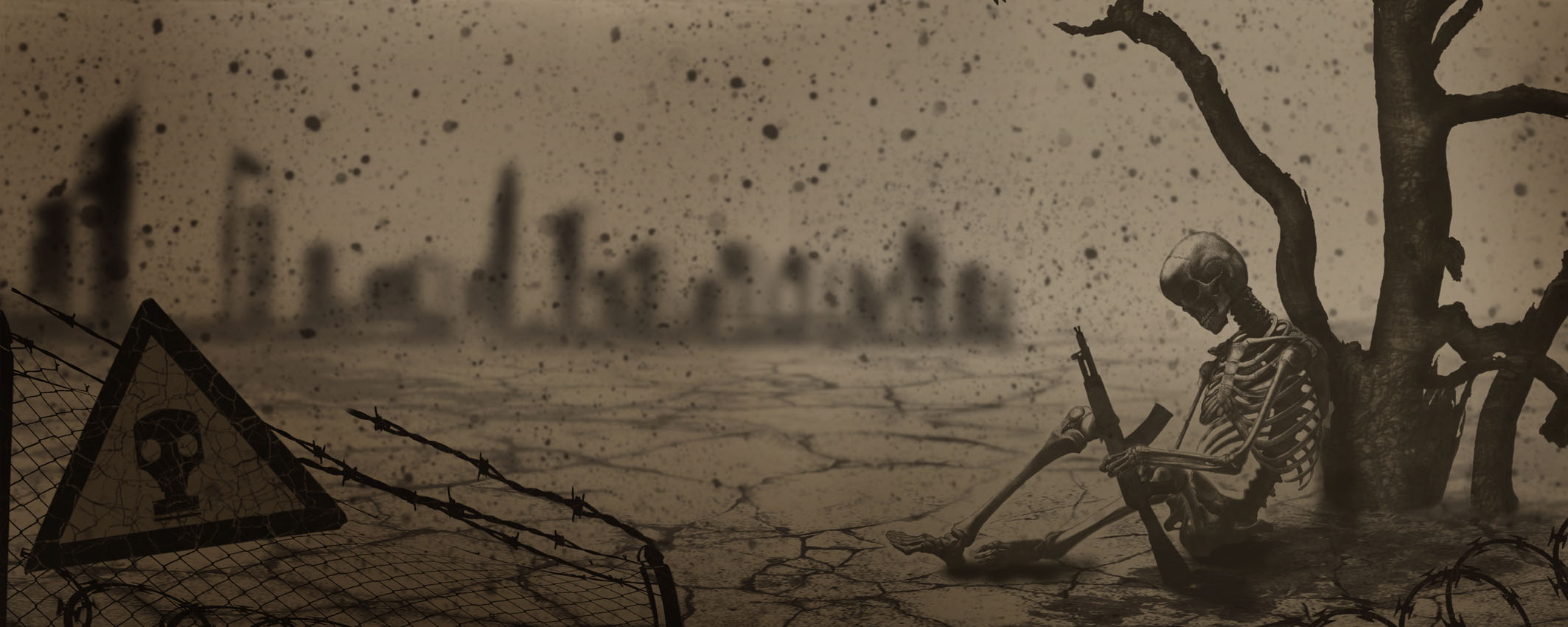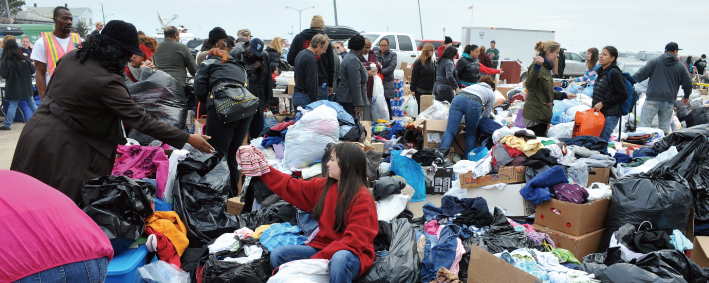Three Common Core Courses on Offer in the Summer Semester!

The Common Core (CC) is pleased to announce that three CC courses will be offered this summer: ‘War, Peace, and the Natural World’ (CCST9054), ‘Media in the Age of Globalization’ (CCGL9011) and ‘Dilemmas of Humanitarian Intervention’ (CCGL9036). A summary of the course details of the courses is at below.
Taking CC courses in the summer will give you relief from your heavy workload during the regular semesters, a shorter course-term, and, since the summer courses are also open to overseas students, you will have the opportunity to expand your cultural horizons and make new friends from around the world.
WHO should take CC courses in the summer?
Taking CC courses in the summer would be ideal for you if you have taken less than 24 credits of CC courses in semesters 1 and 2 this year, AND you wish to take another course either in the AoI of Scientific and Technological Literacy or Global Issues (or both if you have taken less than 18 credits of CC courses in semesters 1 and 2 this year) for the purpose of fulfilling the UG5 graduation requirements on the CCNote.
[Note: Students are normally required to successfully complete 36 credits of courses in the CC, comprising at least one and not more than two courses from each AoI with not more than 24 credits of courses being selected within one academic year except where candidates are required to make up for failed credits.]
HOW to select the courses in the summer?
The SIS will be open for course selection during June 12 – 19, 2017 (please see http://aao.hku.hk/sy3/plan-of-study/important-academic-dates/ for details), and the course approval method is by auto-ballot.
Make the Common Core your own and have a great summer!
 |
CCST9054 Scientific and Technological LiteracyWar, Peace, and the Natural World’ |
Course Description
War is often used as a means to advance political agendas and justified through perceived benefits to society. Yet, the act of war is universally disastrous for our planet’s environmental health. War and violent conflicts displace humans, destroy terrestrial and aquatic resources, and lead to the exploitation and extirpation of biodiversity. At the same time, military infrastructure and “off-limits” areas have become some of the world’s best conservation areas.
This course will cover the major themes of conservation biology and ecology through the lens of direct and indirect consequences on ecosystems as a result of human conflicts. These themes include species extinctions, habitat loss, climate change, pollution, invasive species, and a few positive examples of conservation, ecosystem restoration, and species recovery. The course will highlight case studies for students to critically evaluate the conflict and the ecological and socio-economic consequences.

Course Learning Outcomes
On completing the course, students will be able to:
- Identify and describe historical environmental impacts as a result of military actions, violent conflict and war.
- Demonstrate understanding of some of the fundamental concepts of conservation biology.
- Demonstrate inherent link between war tactics and environmental damage.
- Apply the knowledge from above to propose policies that militaries could initiate to reduce their ecological footprint.
- Present the history of war through the perspective of ecology in a format that is suitable for the wider public.
Offer Semester and Day of Teaching
Summer Semester
July 10 – August 4, 2017 (Mon, Wed and Fri) 10:00 am – 11:50 am
Study Load
| Activities | Number of hours |
| Lectures | 24 |
| Tutorials | 8 |
| Fieldwork / Visits | 4 |
| Reading / Self-study | 40 |
| Assessment: Creation of Wikipedia article | 15 |
| Assessment: Video production | 20 |
| Assessment: Peer-review of assignments | 5 |
| Assessment: Writing assignment | 15 |
| Total: | 131 |
Assessment Ratio: 100% coursework
| Assessment Tasks | Weighting |
| Video production | 30 |
| Written assignment | 25 |
| Creation of Wikipedia article | 25 |
| In-class assessments | 10 |
| Peer evaluation | 10 |
Required Reading
- Lanier-Graham, S.D. (1993) The Ecology of War: Environmental Impacts of Weaponry and Warfare.
Course Co-ordinator and Teacher(s)
| Course Co-ordinator | Contact |
| Dr D.M. Baker School of Biologcial Sciences, Faculty of Science |
Tel: 2299 0606 Email: dmbaker@hku.hk |
| Teacher(s) | Contact |
| Dr D.M. Baker School of Biologcial Sciences, Faculty of Science |
Tel: 2299 0606 Email: dmbaker@hku.hk |
| Dr E.J. Pickett Faculty of Science |
Tel: 3917 1286 Email: epickett@hku.hk |
 |
CCGL9011 Global IssuesMedia in the Age of Globalization |
Course Description
In this course, students will examine the role of the media in shaping perceptions of global and local realities, the extent to which the growing access to information from around the globe fosters information sharing and citizen participation in public affairs. The course will also consider the extent to which an increasingly globalized and fragmented media system impacts on power balances in information flow, domestic information production and dissemination. Does media globalization simply amount to the triumph of capitalist consumerism and the media values and institutions associated with the western model of economic and social development? What is the role of Hong Kong, China and Asia in providing their own narratives in the global media? In a multipolar cultural world, how could citizens contribute to the global conversation on local and global issues? The course will also reflect on critical media-related values such as the freedom of expression, privacy and transparency.

Course Learning Outcomes
On completing the course, students will be able to:
- Demonstrate basic understanding of the global media system, in light of contending political, cultural and economic paradigms.
- Demonstrate basic understanding of the role of technology in the development of the global media system.
- Identify and demonstrate basic understanding of the mechanisms by which governments, and business interests influence the framing of news.
- Demonstrate basic understanding of the role of and impact of social media on the global dynamics of information flow and exchange.
- Demonstrate an awareness of the emergence of “new voices” in the global media.
- Demonstrate understanding of the issues of freedom of expression, privacy and transparency in relation to the global media.
Offer Semester and Day of Teaching
Summer Semester
July 17 – August 3, 2017 (Mon, Wed and Fri) 9:30 am – 12:20 pm
Study Load
| Activities | Number of hours |
| Lectures | 24 |
| Tutorials | 8 |
| Reading / Self-study | 44 |
| News and documentary viewing | 8 |
| Assessment: Group debate | 17 |
| Assessment: Group research project | 17 |
| Assessment: Individual paper | 12 |
| Total: | 130 |
Assessment Ratio: 100% coursework
| Assessment Tasks | Weighting |
| Class participation | 12 |
| Group debate | 18 |
| Group research project | 35 |
| Individual paper | 35 |
Required Reading
No required textbook. Students are expected to read widely and stay up to date on current events and major news developments in Hong Kong, China and globally. Selections from newspapers, magazines, business school case studies, website references, and other teaching resources will be prepared using up-to-date sources for classes.
Recommended Website(s)
- Digital Wildfires in a Hyperconnected World
- Framing the News: The Triggers, Frames and Messages in Newspaper Coverage, A Study of the Free Speech Debate, University of Oxford
- Mapping Digital Media, by Open Society Foundations
- Project for Excellence in Journalism
- The International Encyclopedia of Communication
Recommended Reading
Selections from:
- Altschull, J. H. (1995). Agents of power: The media and public policy (2nd ed.). White Plains, NY: Longman Pub. USA.
- Bennett, W. L. (2011). News: The politics of illusion (9th ed.). New York: Pearson/Longman.
- Bremmer, I. (2013). Every nation for itself: Winners and losers in a G-zero world. New York: Penguin.
- Chan, J. M., Lee, C. C., Pan, Z., & So, C. Y. K. (2002). Global media spectacle: News war over Hong Kong. Hong Kong: Hong Kong University Press.
- Herman, E. S., & Chomsky, N. (2002). Manufacturing consent: The political economy of the mass media. New York: Pantheon Books.
- MacKinnon, R. (2012). Consent of the networked: The world-wide struggle for Internet freedom. New York: Basic Books.
- Postman, N. (2005). Amusing ourselves to death: Public discourse in the age of show business. New York: Penguin Books.
- Rampton, S., & Stauber, J. C. (2003). Weapons of mass deception: The uses of propaganda in Bush’s war on Iraq. New York: Jeremy P. Tarcher/Penguin.
- Ravi, N. (2005). Looking beyond flawed journalism: How national interests, patriotism, and cultural values shaped the coverage of the Iraq War. Harvard International Journal of Press/Politics, 10(1), 45-62.
- Schiffrin, A., & Kircher-Allen, E. (2012). From Cairo to Wall Street: Voices from the global spring. New York: New Press.
- Seib, P. (Ed.). (2012). Al Jazeera English: Global news in a changing world (1st ed.). New York: Palgrave Macmillan.
- Tumbler, H. (2008). Journalism: Critical concepts in media and cultural studies. New York: Routledge.
- UNESCO. (1978, November 28). Declaration on Fundamental Principles concerning the Contribution of the Mass Media to Strengthening Peace and International Understanding, to the Promotion of Human Rights and to Countering Racialism, Apartheid and Incitement to War (Document 20C/20 21). From http://www.unesco.org
Course Co-ordinator and Teacher(s)
| Course Co-ordinator | Contact |
| Dr K.W. Fu Journalism and Media Studies Centre, Faculty of Social Sciences |
Tel: 3917 1643 Email: kwfu@hku.hk |
| Teacher(s) | Contact |
| Dr K.W. Fu Journalism and Media Studies Centre, Faculty of Social Sciences |
Tel: 3917 1643 Email: kwfu@hku.hk |
 |
CCGL9036 Global IssuesDilemmas of Humanitarian Intervention |
Course Description
The course takes a very broad understanding of humanitarian intervention, looking not only at states but also at international NGOs and the aid business, and not only at aid but also at other forms of political action. It focuses on the emergence of humanitarian intervention, its contemporary nature, success and failure, moral challenges, and ways forward. It examines dilemmas generated by great power politics, by the tension between state sovereignty and global humanitarian action, by resource constraints in a world of potentially limitless need, and by issues of authentic country ownership. It explores these issues both through overview analysis in lectures, and through real-world case studies in seminars. In classroom discussion, students’ country expertise will be very much in the lead. The course is assessed 100% through coursework, with class participation and one term paper counting towards the final grade.

Course Learning Outcomes
On completing the course, students will be able to:
- Describe and understand humanitarian intervention through an awareness of both historical development and territorial reach.
- Use the relevant information about humanitarian intervention to analyze and explain the issues of principle and practice it generates.
- Demonstrate an awareness of ways forward for humanitarian intervention in the complex circumstances of the contemporary world.
Offer Semester and Day of Teaching
Summer Semester
July 10 – August 4, 2017 (Tue and Thur) 9:30 am – 12:20 pm
Study Load
| Activities | Number of hours |
| Lectures | 24 |
| Tutorials | 8 |
| Reading / Self-study | 90 |
| Assessment: Essay / Report writing | 10 |
| Assessment: Negotiations simulation | 20 |
| Assessment: In-class test | 2 |
| Total: | 154 |
Assessment Ratio: 100% coursework
| Assessment Tasks | Weighting |
| Participation in lectures and tutorials | 10 |
| Simulation | 40 |
| In-class test | 50 |
Required Reading
There is no single text for the course, and even the required readings (below) are merely part of the input students will be asked to make. A key part of the learning during the course will take place through student exploration. To this end, they will be asked to consult a series of websites.
- Barnett, M. N., & Weiss, T. G. (Eds.). (2008). Humanitarianism in question: Politics, power, ethics. Ithaca, NY: Cornell University Press.
- Barnett, M. N. (2010). The international humanitarian order. Abingdon, UK: Routledge.
- Barnett, M. N. (2011). Empire of humanity: A history of humanitarianism. Ithaca, NY: Cornell University Press.
Useful Websites
Students may find the following websites useful:
- Amnesty International
- AusAID
- Bill & Melinda Gates Foundation
- BRAC
- CARE International
- Carter Center
- Catholic Relief Services
- Caux Round Table
- CSR Asia
- Council on Foreign Relations
- Danish Refugee Council
- DFID (UK)
- ECHO (EU)
- Global Centre for the Responsibility to Protect
- Global Citizen
- Global Fund
- Global Humanitarian Assistance
- Global Witness
- Human Rights Watch
- International Committee of the Red Cross
- International Crisis Group
- IMF
- International Rescue Committee
- Lutheran World Relief
- Médecins Sans Frontières
- Norwegian Refugee Council
- OCHA
- OECD DCD-DAC
- Open Society Foundations
- Oxfam
- Physicians for Human Rights
- ReliefWeb
- Save the Children
- United Nations
- UNDP
- UNESCO
- UN Global Compact
- UNHCR
- UNICEF
- UN Watch
- UN World Food Programme
- USAID
- WHO
- World Bank
- World Vision
Course Co-ordinator and Teacher(s)
| Course Co-ordinator | Contact |
| Dr C.J. Fung Department of Politics and Public Administration, Faculty of Social Sciences |
Tel: 3917 5223 Email: cjfung@hku.hk |
| Teacher(s) | Contact |
| Dr C.J. Fung Department of Politics and Public Administration, Faculty of Social Sciences |
Tel: 3917 5223 Email: cjfung@hku.hk |

